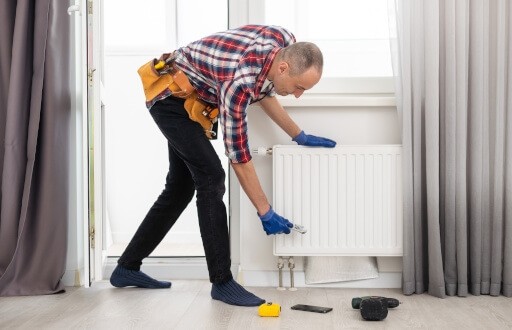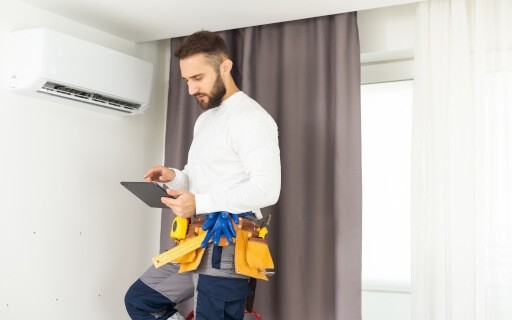Just over 21 million American households rely on a septic system to handle their, ahem, waste. Unlike a centralized sewer system where your home sends wastewater out through underground pipes and to a city-run wastewater treatment facility, a septic system neutralizes wastewater through a tank and a drain field (we’ll cover that later) located on the property of the unit in question.
If you’ve recently purchased a property and you’re unsure if it relies on a septic system, check the water bill. If the city doesn’t charge you for wastewater or there’s a zero-dollar amount for wastewater, then your property likely uses a septic system. It’s also important to note that because a septic system resides on the property, it’s the responsibility of you, the landlord.
Toilet Back-Ups and Overflows
A backed-up or overflowing toilet is a situation that no one wants to find themself in. But this regrettable bathroom mishap could actually be a symptom of a poorly maintained septic tank. Septic tanks work by slowly leeching neutralized wastewater into the soil or a designated area of your property, also called a drain field. If your septic tank isn’t leeching water properly, the wastewater can travel back up into your pipes and up through the toilet.
If your tenants are consistently reporting an overflowing or backed-up toilet, make sure you have the proper tools in the unit so they can at least take care of the problem.
Provide a plunger for your tenant(s)
If your property relies on a septic system, make sure your tenants have a plunger on hand in case of a back-up.
Keep a drain snake in the unit
A drain snake or a toilet auger is an important tool to have in a property that has a septic tank. This tool helps break up any blockages in the pipes that a plunger would be ineffective against.
Septic-safe drain cleaners can keep your tank healthy
Using the usual drain cleaners for either shower drains or toilet blockages can spell disaster for your septic system by disrupting the bacteria that help neutralize wastewater. Make sure your tenants only use septic-safe cleaners, preferably ones that include beneficial enzymes, to keep your pipes clear and your septic system in working order.
If your system is maintained and pumped every few years and you stay on top of adding the proper enzymes and additives, then you shouldn’t worry about an overflowing toilet every now and then. But if it’s a common occurrence, you might be dealing with a larger problem.
The Negative Effects of Septic Additives
Maybe you’ve seen commercials or ads for septic tank additives that promise to add beneficial enzymes and bacteria to your septic system. Ideally, these products keep good bacteria in your tank that help break down solids from the wastewater. Overusing them, however, can actually do more harm than good.
Instead, make sure your tenants are clear on how to care for a septic system and what products to keep from going down the drain:
- Avoid the consistent use of drain cleaners, especially those that are not septic-safe.
- Avoid consistent use of bleach and harsh detergents and cleaners.
- Don’t dispose of prescription medicines by pouring them down the drain or flushing them.
- Don’t let paint, antifreeze, or other hazardous chemicals down the drain.
- Avoid letting non-biodegradable solids into the septic system.
- Don’t pour oil or fat down the drain.
Consider adding a section about septic tank care as a part of the house rules in your lease. This way, you and your tenants can be on the same page when it comes to preserving the life of your septic system. You will also be able to hold them responsible should any of the items you’ve specified as restricted end up damaging the system.
How to Avoid the Dreaded Septic Tank Smell
One of the biggest grievances voiced by septic tank owners is that when things go wrong, you may notice a certain smell. The fact is, your septic system’s job is less than glamorous, but the side effects of what goes on in the tank should never be obvious in or outside of your home. If your system is properly sealed and water remains in the trap in your toilet, any other smells from your tank are most likely the result of it overflowing. Here are some common causes:
- Excess rain can waterlog your drain field. A drain field that has seen a lot of rain can’t do its job properly, meaning the leeched wastewater can rise to the surface. Wait until things dry out before you assume there’s a problem.
- A broken pump. If your transfer or ejector pump is broken, wastewater won’t be moving through your system as it should. It could be a tripped breaker, a clogged pipe, or a bad pump, so you should call a professional.
- Frozen tank or outflow pipes. If your tenants are experiencing some seriously cold weather, your septic system may have frozen. They’ll have to limit their use of the system until the weather warms up.
- You have a leak in your plumbing. If your system is sealed properly and you aren’t faced with any of the problems above, you may have a small leak in a drain line or other plumbing joint.
Work with Your Tenant to Protect Your Septic System
The first step to ensuring the health and safety of your tenant and the septic system in your rental is to make the tenant aware of the situation. As discussed earlier, consider putting a section in your lease that clearly defines how to properly care for the septic tank and prevent any mishaps. You should also mention that your property uses a septic system to any prospective tenants in case they have never lived in a home with a septic tank. Additionally, in the event tenants need help with a repair, provide an easy way for them to submit a maintenance request. With Apartments.com, tenants can submit maintenance requests online, and you can update them as the repair progresses.
Your rental property is a complex system, including the septic tank if you have one. Don’t worry, millions of Americans use a septic system every day. Just be sure you know how to care for and your tenants do too, and you should be in good shape.











